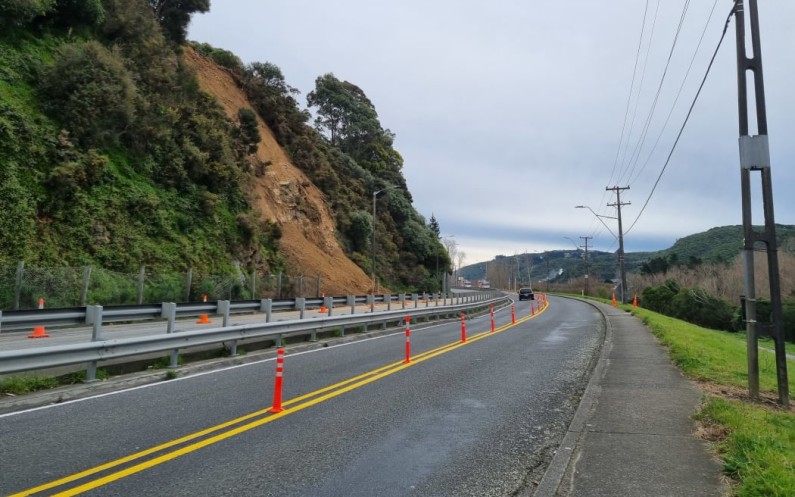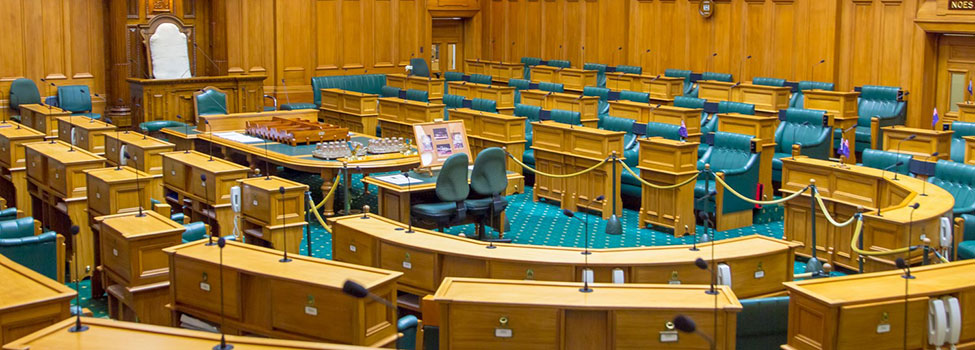
Why are we waiting?
I attended the meeting at the Hub in mid-August where the Hutt City Council’s Chief Executive Officer spoke about the significant slips on the road between the Stokes Valley Roundabout and Pomare and how Council was going to deal with it.
The CEO was quite nervous. I suspect she thought she was about to be lynched. While the mood at the meeting was controlled I felt things could have got out of control quickly. The council should have sensed the mood of the meeting and acted a lot more quickly and decisively in removing the problem, alas this was not to be.
It appears the average New Zealander (in this case Stokes Valleyans) has become complacent, sheepish almost, accepting what they are told by Council/Government, unlike our Australian cousins that tend to voice their discontent about unfair situations. When you consider that there was a slip on Wainuiomata Hill that was cleared almost immediately, I presume that’s because Campbell Barry (our current mayor) did live or does live in Wainuiomata and he has obviously put Wainuiomata first.
The blockage on Eastern Hutt Road has created immense pressure on Stokes Valley Residents and Stokes Valley Businesses alike, the economy is bad enough without this situation dragging on. I'm just wondering when we will see some business closures and staff redundancies. I wonder if the current Mayor and Council have thought about this? I certainly have.
I certainly feel that the current Council is going in the wrong direction. They are allowing housing intensification across all areas of the Hutt Valley which will eventually turn into slums. They blame this on Government Mandates but surely they can take a leaf out of Christchurch City Council's book and stop infill housing. I wonder about their cycle lane policy which in my view makes some roads really dangerous especially when you only see one or two cycles on them daily as I do, and I'm appalled at what's happening in council.
According to Leigh Sutton’s August ‘Stokes Valley Times’ any normal employer would be dealing with a personal grievance and of course we as rate payers would be paying for the costs awarded against them.
If we want to see some changes and Eastern Hutt Road being fixed and less housing intensification, consideration should be given to looking for a new Mayor and Council. I've heard Tony Stallinger speak. He makes a lot of sense and he’s not a politician. I know Tony Stallinger and his United Hutt team will be good for Stokes Valley and Hutt City.

Bad Tax Law and why it’s so dangerous
Bad Tax Law can be defined by two simple characteristics:
- It produces different tax outcomes for different sectors/different taxpayers, even when they’re seemingly doing the same thing.
- It’s designed to engineer a social outcome rather than gather revenue fairly and equitably.
Such as the Government’s law removing the deductibility of interest on existing residential investments. This law was passed to make residential property investment less appealing and to drive down the value of residential property in an attempt to give first-home buyers an easier road to home ownership.
To enact the law, the Government was forced to abandon a cornerstone of fairness in our tax system for one specific group of taxpayers; residential investors. This fundamental fairness principal is that interest should be deductible when debt is taken on to fund income-earning assets.
Why is Bad Tax Law dangerous?
Generally, taxpayers respect laws that are fundamentally fair to all – regardless of whether they personally like them or not. When this fairness is removed, and taxpayers see unfair outcomes, they become resentful, angry and non-compliant.
Non-compliance due to unfairness in a tax system can be compared to the impact of inflation on an economy. It undermines it. And the more it’s undermined, the harder it is to win back compliance.
The second (and more subtle) danger is that bad tax law needs to be constantly modified and altered to ensure the social outcomes it was designed to achieve continue to be met – particularly as economic circumstances change. This means adding more and more layers of complexity to an already very big ‘onion’. Such complexity drives costs up and further increases taxpayer resentment and non-compliance.
Again, the move to a 10-year Brightline and the removal of interest deductibility on residential investment property are classic cases in point. Would you believe that the IRD’s document explaining how we might interpret and apply the government’s new bad tax law (known as ‘Special Report on Interest Limitation and Additional Brightline Rules Public Act 2022 # 10’) is two hundred and fifteen pages long!
This sort of complexity is why taxpayers now need to pay for a full-blown tax opinion in order to answer as simple a question as “will I need to pay tax when I sell this house?” or “will I be able to claim interest on my mortgage to buy this two-year-old rental property?”.
The need to constantly update and add complexity to keep bad tax laws in check was further evident this month. The Government announced (in response to outcries from the corporate build-to-rent sector) that it would provide an exemption to the interest deductibility rules for projects that are 20 units or larger, where the units are offered with 10-year tenancies.
The clue that this is more bad tax law to modify existing bad tax law is that, again, it creates an environment of ‘winners and losers’. Why should someone building a 19-unit development have a different tax outcome than someone building a 20-unit development – especially when it comes to something as fundamental as interest deductibility?
There’s also the social agenda around the requirement to offer a 10-year tenancy in order to gain a tax exemption. While we have no problem with a 10-year tenancy being offered, dangling a tax carrot to achieve it moves the focus away from fair revenue gathering toward a social agenda. This sort of law creates distortions and impacts the market in ways that are often not necessary or intended.
Consider this; Recent hikes in interest rates (required to curb the inflation that the Government’s own policies created) have been enough to turn the residential housing market downward. It makes you wonder whether it was necessary to introduce the bad tax law that robbed residential investors of the fairness they were entitled to rely on in the tax system; especially when that same law change has resulted in spiralling rents for tenants and made it harder for them to buy a first home.
HAVE WE GOT YOU THINKING?
Give us a call on (04) 563 6965 or email: dennis@taxman.co.nz or shawn@taxman.co.nz
Keep an eye out for October’s article!
